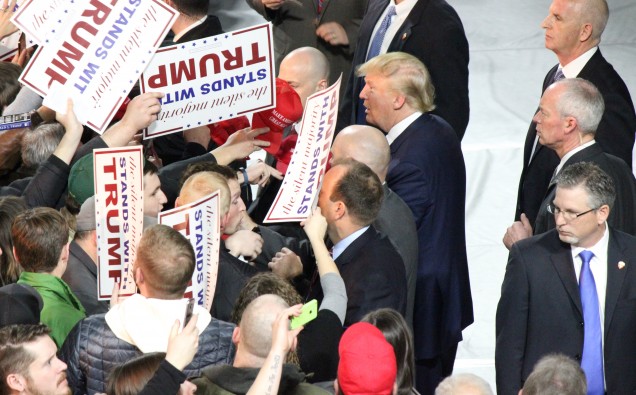
Republican presidential frontrunner Donald Trump had a first real taste of “angry voters” in Chicago when he was forced to call off a campaign rally by protesters over his flammable remarks that have fueled anti-Muslim sentiments and enraged Latino immigrants across the country.
Trump’s forcible expulsion of African-American protestors from his North Carolina rally and at political gatherings elsewhere have also upset a lot of people in the large community and the Republican Party establishment.
The New-Yorker billionaire’s rhetoric against illegal immigrants and his provocative and offensive comments against Islam in the aftermath of Paris and San Bernardino terrorist attacks have played well with disgruntled voters and fear-mongers.
But, the chaotic scenes at the University of Illinois exposed the other breed of angry voters torn apart by Trump’s divisive politics that is perceived to be infusing elements of ethnic hatred and religious bigotry into a society known for its tolerance and diversity.
Although, Trump later said he does not want anybody to be hurt, his outbursts against anyone opposing his style of politics had already done the damage, and infuriated people, and politicians belonging to both Democratic and Republican parties.
The exchange of verbal and physical blows between protesters and Trump’s supporters aired live on national broadcast followed a CNN-sponsored Republican presidential debate and an interview to the same channel this week where Trump’s remarks of “Islam hates us” touched a new low in Islamophobia.
“I mean a lot of them. I mean a lot of them,” was his response, when asked if he thinks all 1.6 billion Muslims hate Americans. Little did he realize the ramifications such statements can have from a person that could be the next president of the world’s sole super power. His rival Senator Marco Rubio, though, was quick to realize that.
“I know that a lot of people find appeal in the things Donald says because he says what people wish they could say. The problem is, presidents can’t just say anything they want. It has consequences, here and around the world.”
Trump’s way of politics is certainly a fodder for radical extremists in the Muslim world and plays into the hands of those who are trying to create a wedge between the West and the Muslim countries, and seek to push the global politics on a dangerous course.
This, however, is not what the Republican frontrunner believes, as he continues to enjoy political mileage from his provocative comments.
But his assertion that there is a “tremendous hatred” among Muslims for Americans runs counter to the reality. It is certainly not what Americans think of their fellow Muslim Americans.
According to a Pew Research Center Survey released in February, 42 percent of Americans think that just a few or no Muslims in the U.S. are anti-American. As much as 49 percent of respondents say that at least some Muslims have some anti-American sentiments. Those who echoed Trump’s assessment were just 11 percent.
The same survey tells that “half of Americans say the next president should be careful not to criticize Islam as a whole when speaking about Islamic extremists”.
Most people think the problem with violence committed in the name of religion is people rather than with religion per se. “Indeed, fully two-thirds of Americans say the bigger problem is that some violent people use religion to justify their actions”.
These findings are in line with another Pew Survey released in November 2015 based on data collected in 11 countries with significant Muslim populations. An overwhelmingly majority of people there expressed negative views of the ISIS, which has sprung from the ashes of Iraq war, and is blamed for new wave of violence and extremism in the civil war and sectarian environments of Syria and Iraq, also poses a threat to international peace.
“In no country surveyed did more than 15% of the population show favorable attitudes toward Islamic State. And in those countries with mixed religious and ethnic populations, negative views of ISIS cut across these lines.”
“Divisive rhetoric”, the kind Mr. Trump is echoing will do no good to the nation, Democratic candidate for nomination Hillary Clinton warned, according to The Washington Post.
“All of us, no matter what party we belong to or what views we hold, should not only say loudly and clearly that violence has no place in our politics, we should use our words and deeds to bring Americans together,” the former secretary of state said.












